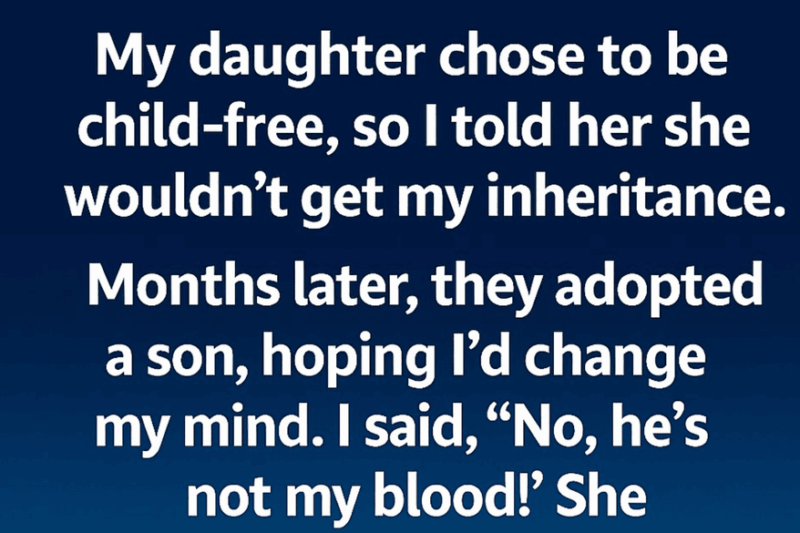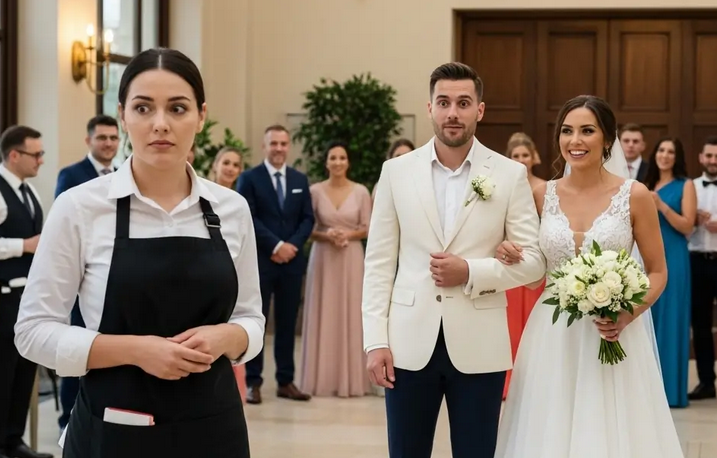I spent my semester savings to secure extra legroom for a 10-hour flight. During boarding, a woman with red, swollen eyes approached me, asking to switch seats. Her son sat next to me, while her seat was far back in the plane. “My father passed away,” she explained, her voice heavy with grief. I felt a pang of sympathy, but I declined her request. Later, I saw her silently crying, clutching a crumpled tissue, her gaze fixed on her seatbelt.
I glanced at the boy beside me—around ten or eleven, thin and pale, with dark curls and anxious hands fidgeting with his backpack straps. He stayed quiet, his eyes locked on his mother as if she were his anchor. I considered offering a quiet apology, but instead, I turned to the window, pretending to sleep.
Guilt weighed on me throughout the flight. Each time the boy moved, sniffled, or breathed heavily, I tensed. The flight attendant passed by, her expression unreadable—perhaps judgment, perhaps exhaustion.
Midway through the flight, I handed the boy my unopened juice and a granola bar. He accepted them with a small nod and a whispered “thank you.” No deep conversation followed, no heartfelt connection. Yet, his soft voice lingered in my mind.
When we landed, the woman hurried past me, gripping her son’s hand tightly, and they vanished into the airport crowd. My throat tightened for reasons I couldn’t fully grasp. I hadn’t done anything wrong—I paid for that seat, and long flights cause me leg cramps. Still, something felt off.
Two weeks later, in my shared apartment, I struggled to focus on studying for an upcoming exam. My thoughts kept returning to that moment on the plane. Perhaps I was overanalyzing, perhaps not. Either way, the memory wouldn’t fade.
One evening, while heading to the grocery store, I noticed a poster on a community board outside a church. It featured a photo of an older man with gray hair and warm eyes. The heading read: “In Loving Memory of Adrian Malik.” The date aligned with my flight. Below, an invitation to a memorial gathering welcomed anyone wishing to offer support.
Something compelled me to attend the memorial.
The gathering was small, held in a simple hall. I recognized the woman from the flight instantly, dressed in black, holding her son’s hand. I lingered at the back, uncertain why I had come but feeling it was necessary.
After brief speeches and prayers, people shared stories about Adrian Malik. He was a beloved mechanic in a small neighborhood, known for fixing flat tires for free or waiving repair bills for those in need.
One woman shared, “I brought him my old car, thinking it was beyond repair. He fixed it, filled the gas tank, and even gave me sandwiches for my kids, saying it was nothing.”
A man added, “Adrian always had greasy hands and time to help a stranger.”
Each story made me feel smaller. This man wasn’t merely a name—he had left a mark on many lives.
Then the woman from the flight spoke. Her voice trembled but held firm.
“He was my dad,” she said. “He taught me resilience, even when life felt unfair. He adored his grandson above all else. He was our foundation.”
Her son stood behind her, eyes red but composed. She continued, “On the flight home, I sat in the back, far from my son. All I wanted was to sit beside him, to hold his hand for a moment. But I couldn’t.”
Her words struck me deeply.
She didn’t mention me or the seat directly, but I knew she meant that moment. My guilt felt exposed, even if no one else noticed.
I left quietly before anyone could approach me, walking home with a heavy heart. I tried to push the guilt aside, but it lingered.
Life, however, has a way of weaving threads together.
A month later, I began volunteering at a local community kitchen. I hadn’t planned it—just saw a flier near campus and felt drawn to it. I thought helping others, even strangers, might balance out my earlier choice.
At first, I chopped vegetables, washed trays, and chatted lightly with other volunteers. Over time, it became more meaningful. I showed up even on unscheduled days, learning names, stories, and faces.
One evening, a woman and her son entered the kitchen. I didn’t recognize them immediately. She looked weary but less burdened. He carried the same backpack from the flight.
They didn’t notice me at first. They took their food and sat. After a moment’s hesitation, I approached with two cups of lemonade.
“Hi,” I said. “I think we met before.”
She looked up, confused, then recognition flickered in her eyes.
“You were on the flight,” she said.
I nodded. “Yeah. I’ve been wanting to apologize. I should’ve switched seats. I was tired and didn’t think it through.”
She studied me, then glanced at her son, who ate quietly.
“You were courteous,” she said gently. “I was grieving and needed a small comfort—to sit with my son. But I understand. It was your seat.”
I swallowed hard. “It still doesn’t sit right with me. I started volunteering here, hoping to do some good, maybe make up for it.”
She gave a faint smile. “You don’t need to make up for anything. Life isn’t about keeping score. But showing up here—it makes a difference.”
Her words stayed with me.
We didn’t become close friends, but she and her son returned occasionally. We’d talk. Sometimes she helped in the kitchen. I learned her name was Lina, and her son was Sami. She was a nurse, working night shifts.
One evening, Sami handed me a crayon drawing of the soup kitchen, with me behind the counter.
“You look funny in a hat,” he said with a grin.
I laughed. “Thanks, I guess?”
He shrugged. “Mom says people mess up, but they can still be kind.”
That simple truth from a child hit me harder than any lecture.
Months later, the semester ended, but I kept volunteering. My social circle shifted toward people who valued community over fleeting trends.
A professor noticed a change in me and asked what had happened. I shared a brief version of the story. He invited me to join a service-learning program, blending academics with community projects.
That led to an internship at a nonprofit, then a scholarship, and eventually a job I truly valued.
It’s strange how one poor choice can spark something meaningful, if you allow it.
I wish I had given up that seat. Truly. But that moment opened something in me. It made me look beyond my own comfort, to see that sometimes choosing discomfort fosters growth.
Lina and Sami eventually moved to another city to care for her mother. We said goodbye over coffee from the kitchen’s machine.
Before leaving, Lina said, “Maybe that seat wasn’t meant for me. Maybe it was a lesson for you.”
She was right.
We all face small choices that carry weight. Moments where kindness requires effort. In those moments, we shape who we are.
Here’s what I’ve learned: kindness isn’t always simple. It can be inconvenient, even uncomfortable. But that’s when it matters most.
If this story resonates with you, share it. Someone else might need the reminder. And next time you have a chance to make a small sacrifice, take it. You never know whose day—or life—you might touch.



